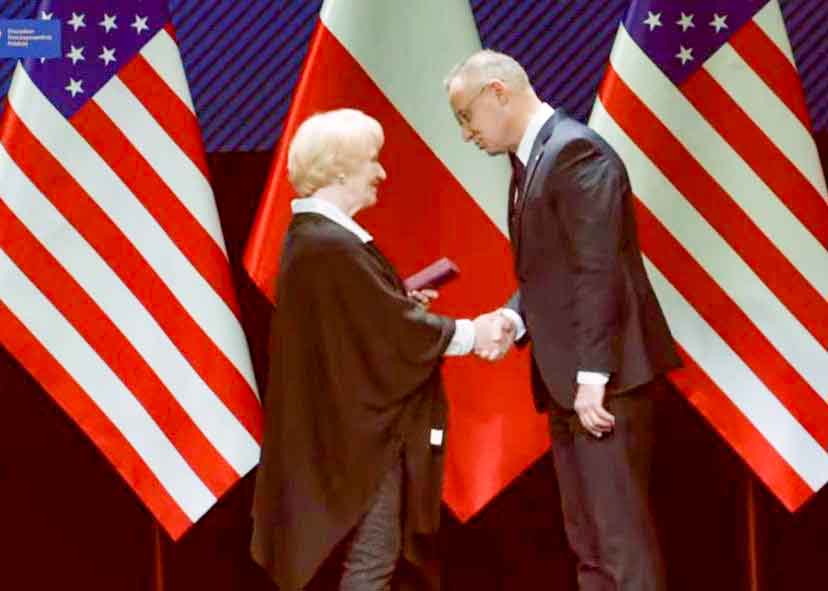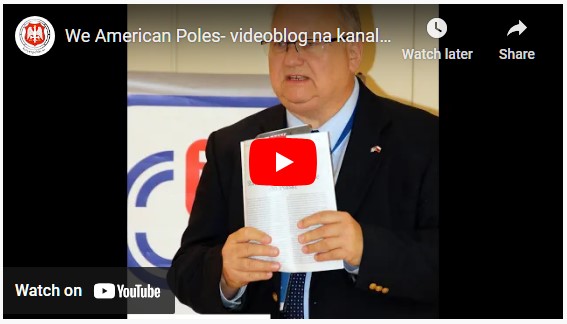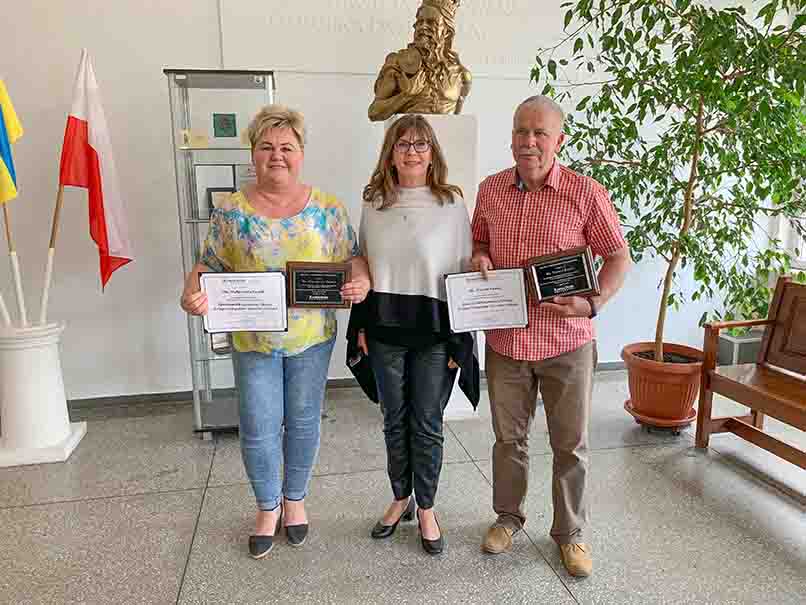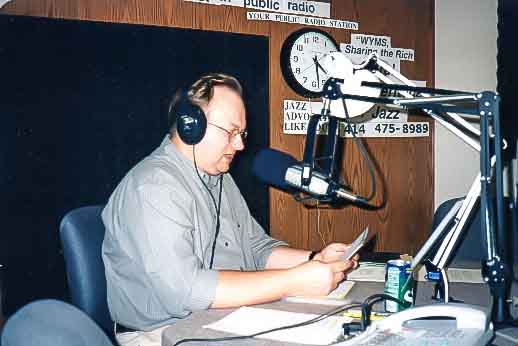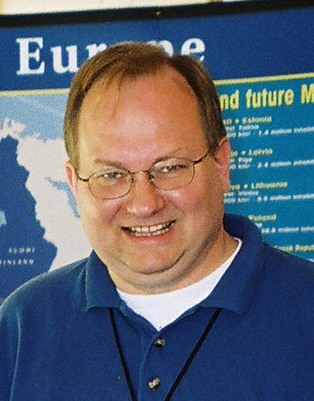The winners of this year's eleventh edition of the Maciej Płażyński Award honoring journalists and media serving the Polish diaspora were journalists and editorial offices from Israel, Poland, the United States, and Great Britain. The jury selected the winners from among 80 nominees.
In the category of Journalist of the Polish Media, the winner is Waldemar Biniecki. The jury recognized him for a series of bilingual publications in «Kuryer Polski», thanks to which the Polish point of view reaches audiences not only in the United States, but all over the world. [Press Club Polska)]

Waldemar Biniecki, Editor-in-Chief of "Kuryer Polski"
A recent study in the United States by Dr. Dominik Stercula, professor of political science at Colorado State University, entitled "Polish Americans Today" clearly shows that the number of Polish Americans still oscillates slightly below 9 million (8,969,530), which is approx. 3% of the entire population of the United States, 2.7% to be exact, but the most important part is that 95% of American Poles were born in the United States. From year to year, however, we can see the progressive assimilation of this huge ethnic group in the USA, i.e. the gradual depolonization of this group.
What does it mean? In my opinion, this means that the current leaders of the American Polonia, as well as the politicians from Poland, have nothing to offer to this large population. The leading Polish diaspora organizations communicate only with their members, utterly failing to address the entire Polish diaspora in the USA, or to the global Polish diaspora in the world, or Poles in Poland. There is no vision for communication. As a result, 9 million American Poles have nowhere to find information and, thus, knowledge about Polish identity, the Polish diaspora, and Poland. There is no policy or vision of how to reach them and what to offer them.

Maciej Płażyński Awards (nagrodaplazynskiego.pl)
Belief in the e-mail system and newsletters (that reach only a small group of this diaspora) displaced the Polish media, which ceased to be of any importance to Polish leaders. That's because the nominal leaders of the organization cannot control the free media. The media still group the Polish elite that the official leaders of the Polish diaspora treat as a political competition.
Even before World War II, there were about 250 journalists in the US in the thriving Polish newspapers. The peak period of development of the Polish press in the USA fell in the years 1925–36, when approx. 170 journals (including 15 dailies) were published simultaneously with a total circulation of approx. 1.2 million copies. The first generation of magazines that gained the greatest popularity included, in addition to "Kurier Polski": "Gazeta Polska" and "America Echo". The Polish diaspora press in the USA is distinguished by its longevity — of over 85 years; among others, "Dziennik Polski" (Detroit, from 1904), "Union Journal" (Chicago, from 1908) and "The Pole Star" (Stevens Point, from 1908).
After the Second World War, the communist governments fought against the Polish media in America, because it maintained the Polish national identity of a sovereign and independent Poland. Gradually, the collapse of the Polish press began and the assimilation of Polish journalists into the American media system.
The situation did not change after 1989, when the Polish community in America started following Polish media, and the development of the Internet wreaked final havoc. The American Polish community was seduced by the ongoing Polish-Polish war in Poland, which led to its polarization and a decline in its importance in the American world.
Today, after the pandemic, the condition of the Polish media in the US is downtrodden. Nobody thinks of Polonia as a significant power in the American system anymore. There used to be famous titles in Chicago and even in New York. Hardly anyone buys publications widely known as recently as 10 years ago.
The mistake of today's media is that they try to imitate the American news outlets, reporting on local events, fleeing from politics, considering it fatal for the development of the Polish diaspora, and the reality is rather the opposite. Only involvement in Polish and American politics can wake the Polish diaspora from their hapless slumber.
Stercula's research also shows the deep faith of some Polish circles in conspiracy theories. Nobody studies examples of other ethnic groups that build their positions based on their politicians and ethnic media. There is a widespread principle among Polish community leaders that we only deal with the promotion of Polish culture, and even are not allowed to deal with politics at all.
This is why there were no Americans of Polish descent on the Trump team, and neither there are on Biden's team. The Polish political elite avoid all freaks and "true patriots".
Polish diplomacy, which tries to avoid media, does not provide information to the Polish media because too close of a relationship between Polish diplomats and Polish journalists could harm the former. Even the Sanacja (1930s - ed.) diplomacy, despite the fact that it did not have good relations with the Polish diaspora at that time, flooded the media with information about the local political and economic events.
The experiences of Kuryer Polski that reactivated the tradition of the first permanent newspaper under the same title, in the fight for Polish interests in the USA, give rise to moderate optimism.
Kuryer Polski is a bilingual website with an ambitious plan to reach these 9 million Polish Americans in English. We survived the first year in the US market, driving the professionalism level up, clearly defining standards, and soliciting the participation of experts who write for us. We adopted the principle that we do not get involved either on the side of Democrats, or Republicans, or PiS (Prawo i Sprawiedliwość, Law and Justice Party, presently governing), or PO (Platforma Obywatelska, Civic Platform, currently in opposition), or anti-vaccine folks, either pink or green aliens, or any other group in particular.
We are interested in the role and importance of the Polish diaspora and building its position in the USA, Poland and the world. Our texts end up on the American Internet as source texts for many of the subjects we touch upon.
The biggest problem we face is the lack of funding for promotion, translations and equipment. We are all volunteers, which causes a bit of a slowdown in operation. It is true that we have obtained small government grants from Poland, but we are not the government's favorites, therefore financing from Warsaw is rather symbolic and is subject to formal, bureaucratic red tape, where it is easy to lose independence along the way. This, of course, is a separate topic.
Polish diaspora have been successfully silenced in Poland, as have other debates on the development of Poland. If you do not belong to any of the political clans, the opportunities for expression are very minimal. In Poland, instead, institutions “dealing with the Polish diaspora” are springing up like mushrooms after the rain. Everyone suddenly becomes experts on the Polish diaspora, although they have never lived outside their homeland even for a month. They become the beneficiaries of the Warsaw grants and they dominate in coming up with ideas of what the Polish diaspora should do.
The same actions were taken by the Sanacja governments and it ended badly. Relations between the Polish American community and the Sanacja government of the Republic of Poland were rather rough. And it's all about the prevailing belief that everyone in Warsaw knows everything better. As Jacek Bartosiak says in his appeal to the decision-makers:
Time for changes in the Polish state. We appeal to decision-makers to change the quality of the Polish state. It must not run like it has for the last 30 years. Present times will be much more demanding.
Therefore, it is worth taking seriously all Polish media in strategically for Poland important countries. Invest in Polish journalists living abroad, invest in bilingualism of these media. Time for professional treatment of these media as a significant value-added, and not a burden that needs to be "dealt with" in Warsaw. Bilingualism of the Polish media and linking them into a dense network of people working for the Polish raison d'etre within the media structures should become a developmental model, reaching — in their native language — to those who use it, as well as those — in the language of the country of residence — who want to learn about Poland and the Polish diaspora. However, uniting Poles to achieve collective success requires a cross-party vision that Poland still lacks.
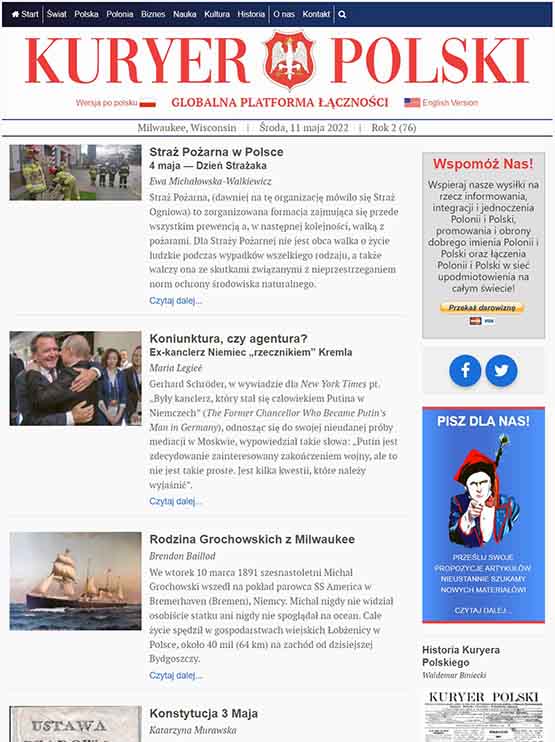
The website of Kuryer Polski from Milwaukee
That is why we reactivated Kuryer Polski and created a platform for connecting potentials by ourselves and now our articles appear in the global media space in English and Polish. We plan to create a place for Polish business in Kuryer Polski and that is why we are looking for visionaries who would support our portal in this endeavor. An example of such a visionary in the United States, about whom we wrote about in Kuryer Polski as one of the most famous experts in the field of "connectivity" is, for example, Parag Khanna and we should learn from him.
Finally, I would like to thank the committee of the Maciej Płażyński Award for Journalists and Media Serving the Polish Diaspora for granting me, and at the same time Kuryer Polski from Milwaukee, this prestigious award; Krzysztof Gajda from the Association of Poles in Texas, as well as the author of Kuryer Polski, for submitting my nomination for the competition; Teresa Sygnarek, president of the World Association of Polish Media Abroad, for submitting the nomination of Kuryer Polski; and all Kuryer authors — professors, lawyers, editors and other professionals — for texts at the highest world-class professional level. There would be no Kuryer Polski without you.
Our medium has been noticed and its star shines brightly on the English-speaking Internet. Thank you and welcome to our columns: www.kuryerpolski.us.
Translation from Polish by Andrew Woźniewicz.




